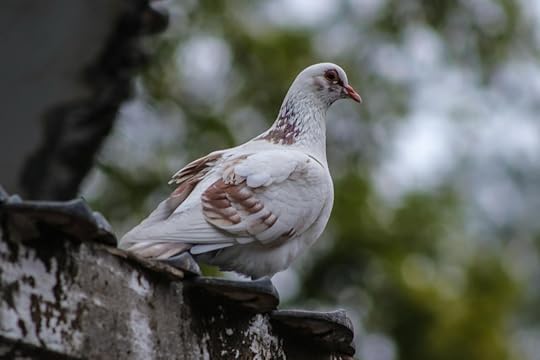The Proof Of My Innocence by Jonathan Coe – White Doves and Pigeons

The Proof Of My Innocence by Jonathan Coe, is a kind of self-referencing, meta-fictional (whatever the right term is) account of a group of 1980s Cambridge graduates, some of whom get involved in extreme right wing politics. A young woman recently out of university – a child of this 1980s generation – tells the story of what happens forty years later, when those who turned sharp right out of university reach a final showdown with those who took a gentle left, or just wandered straight on. This is the young woman’s first attempt at a novel, and it combines the three genres she decides to try – cosy crime, dark academia and auto fiction.
So these three genres. Auto fiction – writing based on the writer’s own life. Dark academia – the story of a tightly linked group of people who meet at an ancient university, and typically deal with some violent secret. Cosy crime, where a murder takes place in a charming English village or country house, the crime usually solved by a combination of local detective and keen civilian.
All these genres are used to reflect the reality of modern Britain.
Cosy crime? Well for this I’m going to take you away from the book for a moment, to an odd garden near where I live, a small fenced compound by the river, probably associated with a mooring. The fencing is seven feet high, topped with reams of barbed wire twisted together with fairy lights and wind chimes. The narrow space within is full of the most twee British miniature landscapes, made with fake grass and blue-coloured glass pebbles to indicate rivers. This tiny shire is peopled by hundreds of large and small figurines – gnomes dressed in Union Jack outfits, a king and queen waving to their subjects, a grandma doing some knitting, a bride with a bouquet. There is a towering aviary at one end, where white doves come and go. Well, they were white. Now there are a number of mottled birds, as the white doves have interbred with local pigeons. It was on the bird enclosure that the owners of this garden placed their Brexit Party and Vote Leave banners. This bizarre enclosure reminds me of cosy crime, apparently small scale, gentle, traditional, but with barbed wire twisted into its fairy lights and tinkling chimes.
Dark academia is similar, characteristically British, traditional, ordered and disconcertingly violent, particularly when its order and tradition are threatened.
Then there is auto fiction based on yourself as an individual. One of the 1980s dark academia characters goes to a lecture during his Cambridge days. The lecturer talks about the idea of the double act in show business, as a tiny model for society, where people get irritated with each other, fall out, make up, laugh, and rely on each other. One of the most popular double acts of the 1970s was Morecambe and Wise. Eric Morecambe died in May 1984. As the lecturer explains, it was Ernie Wise without Eric who on New Year’s Day 1985 made the first official public mobile phone call in the UK. A mobile phone became a signature of a society focused on individuals, a society of cultural fragmentation. Ernie’s call coincided with Margaret Thatcher’s government, and the rise of the Right as a major force in Britain.
All three genres are linked by the idea of money, as in cosy crime and dark academia tending to be settings of wealth, and many of the characters we meet in The Proof Of My Innocence expressing their individual course in life in terms of making money. Right wing politics links money with personal worth. You are a valuable person if you have lots of money. You get what you deserve in terms of money, and if you don’t have it you aren’t a valuable person. The Proof Of My Innocence is set in the aftermath of the pandemic, a time when people doing ordinary jobs – nurses, carers, refuse collectors – kept things going. If we didn’t realise it already, covid revealed the disconcerting fact that money does not reflect the importance of a job that someone does. Are you good at football? Singing? Do you want to trade in commodities you never make, grow, or see? If the answer is yes you might get rich. But that wealth is not necessarily a reflection of your quality as a person and your value to society. As portrayed in the book, the Right did not like the pandemic. Yes there was clapping for health care workers, but from some quarters there was also a lot of protest about lockdowns and mask wearing. That long, grinding crisis upset a clear world view based on value and social worth linked to money.
The Proof Of My Innocence presents a portrait of extreme right wing politics as selfish, money orientated, fundamentalist, making a false equivalence between wealth and social value. The stable, traditional values of the right are portrayed ironically as an expression of a modern, technology-driven self-centredness, trampling on the equally old fashioned virtues of compromise and consensus. Barbed wire is twisted in the fairy lights.
The Proof Of My Innocence is a very interesting novel, with the readability of the popular genres it uses. It might sound heavy going re-reading what I have said above, but that’s not the case. It’s entertaining, subtle and clever, celebrating moderation and compromise, none of which gets in the way of an uncompromising picture of the dangers of extreme right wing politics.



